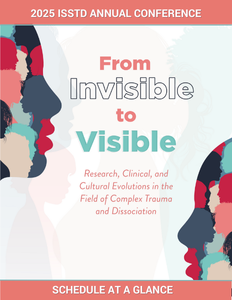Back
Posters
Poster Judging Hour
It's Just A Body: An Exploration of the Experiences, Internal Decision-Making Processes, and Health Care Needs of Transgender and Plural People
Friday, March 14, 2025
6:00 PM – 7:00 PM US Eastern Time

Silver Mckie, BA
Doctoral Student
Washington University, St. Louis
St. Louis, Missouri, United States- SF
Sana Flynn, MEd, LPA (they/them/theirs)
Doctoral Candidate and Predoctoral Intern
University of Houston
Huntsville, Texas, United States
Abstract
People who identify as both transgender and plural (more than one person sharing a body), including those with a diagnosis of Dissociative Identity Disorder, make decisions related to gender identity and presentation, and may engage with healthcare providers to receive gender affirming care. This qualitative study examines the understudied intersection between these two identities and decision-making processes related to receiving gender-affirming care. Using a community-based participatory research design and a non-pathologizing lens, the research team interviewed 15 transgender and plural participants. Participants were recruited through online communities for transgender plural systems. Ten interested participants were preliminarily interviewed via a HIPPA compliant platform to collect demographic data, inform participants of study details, and obtain verbal informed consent, before engaging in an open-ended interview. In the first analysis, a team of four trained coders analyzed de-identified transcripts in two-person teams, which subsequently discussed their decisions among all four coders. A focus group of original participants led to the formulation of five new interview questions, which were used in five additional interviews. Through thematic analysis, five themes related to the intersection of transgender and plural experience were identified, involving embodiment, communication, intersecting identities, marginalization, and authenticity. In the second analysis, a team of three trained coders analyzed open codes relating to internal conflict and resolution processes not fully captured in the first analysis. Three preliminary themes were identified regarding the context of internal conflict, collective decision-making processes, and solutions that promoted harmony within plural systems. Plural participants had rich, embodied experiences of gender that manifested internally and externally; they were able to effectively navigate decision-making regarding harmful societal narratives about transgender identity, external gender presentation, and receiving gender-affirming medical care. Recommendations from the data serve to assist clinicians in understanding and supporting affirming, autonomous and informed decision-making by trans and plural clients.
People who identify as both transgender and plural (more than one person sharing a body), including those with a diagnosis of Dissociative Identity Disorder, make decisions related to gender identity and presentation, and may engage with healthcare providers to receive gender affirming care. This qualitative study examines the understudied intersection between these two identities and decision-making processes related to receiving gender-affirming care. Using a community-based participatory research design and a non-pathologizing lens, the research team interviewed 15 transgender and plural participants. Participants were recruited through online communities for transgender plural systems. Ten interested participants were preliminarily interviewed via a HIPPA compliant platform to collect demographic data, inform participants of study details, and obtain verbal informed consent, before engaging in an open-ended interview. In the first analysis, a team of four trained coders analyzed de-identified transcripts in two-person teams, which subsequently discussed their decisions among all four coders. A focus group of original participants led to the formulation of five new interview questions, which were used in five additional interviews. Through thematic analysis, five themes related to the intersection of transgender and plural experience were identified, involving embodiment, communication, intersecting identities, marginalization, and authenticity. In the second analysis, a team of three trained coders analyzed open codes relating to internal conflict and resolution processes not fully captured in the first analysis. Three preliminary themes were identified regarding the context of internal conflict, collective decision-making processes, and solutions that promoted harmony within plural systems. Plural participants had rich, embodied experiences of gender that manifested internally and externally; they were able to effectively navigate decision-making regarding harmful societal narratives about transgender identity, external gender presentation, and receiving gender-affirming medical care. Recommendations from the data serve to assist clinicians in understanding and supporting affirming, autonomous and informed decision-making by trans and plural clients.

